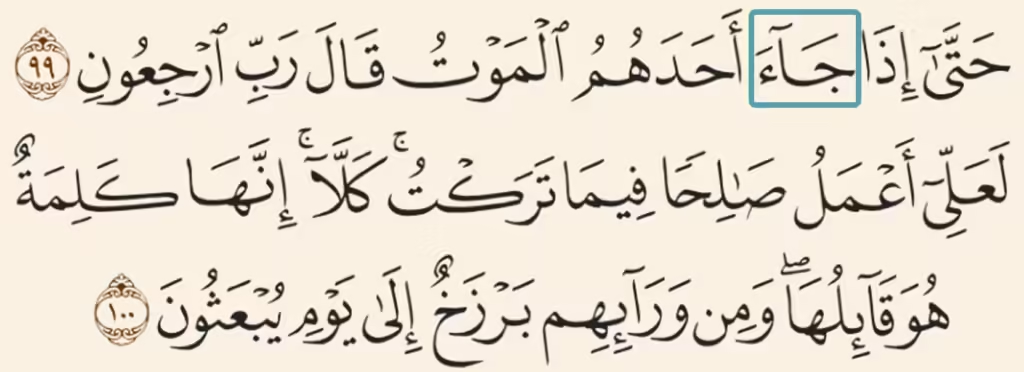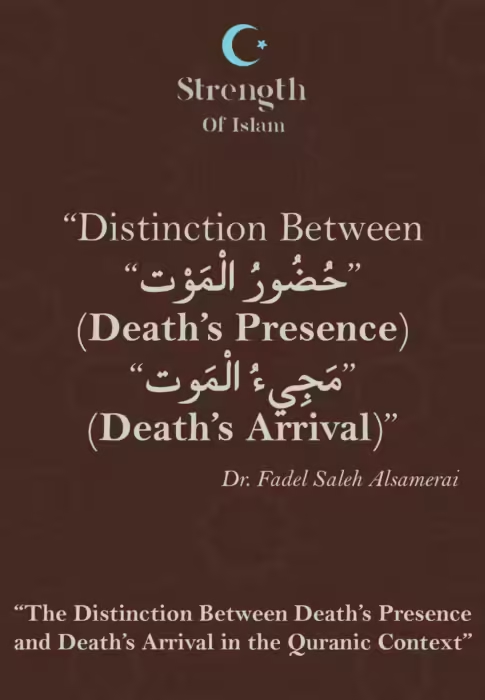Table of Contents
Understanding Linguistic Foundations
The phrases “when death’s presence is upon one of you” and “when death comes to one of you” highlight a subtle difference in meaning. What distinguishes “حَضَرَ/Hadara” (presence) from “جَاءَ/jaa’a” (arrival)?
Let’s start by examining the linguistic nuances before exploring how these terms are applied in the Quran, as Quranic language carries unique characteristics. For instance, the term “البررة/’al-bararah” is specifically reserved for Angels, while “الأبرار/’al-‘abraar” is used for people. Such distinctions reflect a deliberate and precise use of language throughout the Quran.
The Concept of “Presence” in Arabic
In Arabic, the term “حضور/Hudoor” (presence) signifies existence, as in “death’s presence”, without necessarily implying movement or arrival. When you say, “I was present when someone spoke to him”, it doesn’t mean “I was coming”; rather, it conveys, “I was there and witnessed the event”. This is the essence of “presence”—it refers to being there, as opposed to being absent. It emphasizes witnessing, not the act of coming or arriving.
Understanding “Coming” in Arabic Context
The term “مجيء/majii’” (coming) implies movement from one place to another. When someone says, “I was present at their gathering”, it doesn’t imply “I was coming” or “arriving”. In language, “presence” is distinct from “coming”. “Coming” involves a transition from one place to another, often with intention, while “presence” simply denotes existence without necessarily implying intention or movement. For example, saying “I was present when someone spoke” or “I was present in the market when someone struck another” means simply “I existed there”.
Thus, when we speak about ALLAH, we say that HE is “present in every place” but not “coming to every place”. Here, “present” refers to HIS existence, not movement.
Quranic Application and Contextual Usage
Sometimes, one word cannot be substituted for another. For example, in the verse, “…but when the promise of my LORD comes [i.e., approaches], HE will make it level…”1 found in Suurat ‘Al-Kahf – (18:98), we cannot replace “comes” with “is present”. Saying “when … is present” would imply that it already existed, while “comes” signifies that it wasn’t there initially but has now arrived.

Similarly, in Suurat Huud – (11:40): “[So it was], until when OUR command came and the oven overflowed…”2—this does not imply presence; it wasn’t existing or present but rather arrived at that moment.

Thus, “presence” denotes “witnessing” and “existence”, whereas “coming” includes movement from one place to another. It carries the sense of presence and witnessing, but with the added notion of movement, which is absent from “presence”.
Looking at the Quranic use of “death’s presence” and “death’s coming”, we see a distinction: when it says “when death attended Jacob” or “when death comes to one of you,” the Quran uses “death’s presence” specifically in the context of rulings and wills. It’s not referring to death itself but rather to related matters, such as instructions and final wills.
For instance, in the verse, “Or (even) were you witnesses as death was present to Yaaqub? (Jacob) As He said to His seeds’ (Or. sons) “What will you worship even after me?”…“3 (Suraat ‘Al-Baqarah, 2:133) the focus is not on death itself; rather, death is depicted almost as a witness present with His sons. Here, death is present, but the verse’s context is centered on Jacob’s instructions, not on death directly.

When ALLAH uses the term “حَضَرَ/Hadara” (presence), HE is not referring to death itself or the conditions of people during death. Instead, HE is discussing other rulings that apply while death is present among those involved.
For example, consider the verse: “Prescribed for you, when death is present to any of you, in case he leaves behind some charitable (benefit)…“4 (Suraat ‘Al-Baqarah, 2:180). Here, the focus is not on death but on the ruling about making a will.

Similarly, in the verse: “O you who have believed, the testimony between you, when death is present to any of you while bequeathing, shall be two (men) with (i.e. owning) a sense of justice…“5 (Suraat ‘Al-Maa’idah, 5:106). Again, the discussion centers on a ruling, not on death itself, and so on.

However, notice “death’s coming” is used when ALLAH speaks directly about death itself or the state of people at the moment of death. For example: “…when death comes to any of you, Our Messengers take him up, and they (i.e., the Messengers) do not ever neglect. Thereafter they are turned back to ALLAH their Supreme Patronizer“6 (Suraat ‘Al-‘Ancaam, 6:61-62). Here, the focus is on death and what follows it.

Similarly, in the verse: “Until, when death comes to one of them, he says, ” LORD! Return me. That possibly I will do righteousness in that which I have left (behind).” Not at all! surely it is (only) a word he says, and beyond them (i.e., all mankind) is an isthmus until the Day they are made to rise again. Then when the Trumpet is blown…“7 (Suraat ‘Al-‘Mu’minuun, 23:99-101). This passage discusses what follows death, highlighting the irreversible nature of death’s arrival.

In these instances, the focus is on matters directly related to death—either about the person experiencing it or about death itself. For example: “And to every nation (there is) a term; so when their term comes, they will not (be able to) postpone (it) by a (single) hour, nor will they put (it) forward”8 (Suraat ‘Al-‘Acraaf, 7:34), which speaks about an appointed time for each nation.

Another example is: “And the stupor of death comes with the Truth; that is what you were averting. And the Trumpet is blown…”9 (Suraat Qaaf, 50:19-20). Here, the emphasis is on the reality and inevitability of death.

ALLAH Almighty does not use “death’s presence” when discussing death itself; instead, this phrase appears when referring to other rulings in which death is merely present. When HE says “death comes”, it directly addresses either death itself or the state of people at the moment of death. This distinction is a consistent pattern in the Noble Quran.
Sources:
- Dr. Fadel Saleh Alsamerai. الفرق بين ( حضر أحدكم الموت ) و ( جاء أحدكم الموت ) | د. فاضل السامرائي. YouTube Video.

